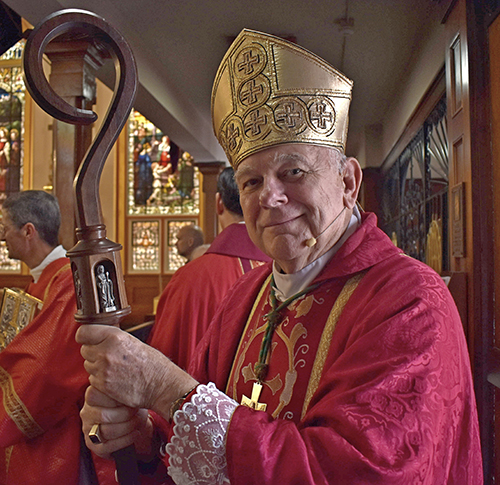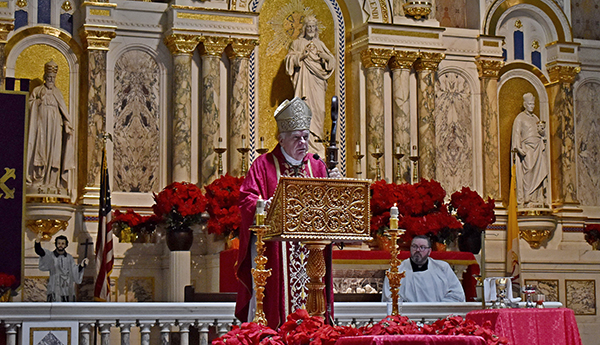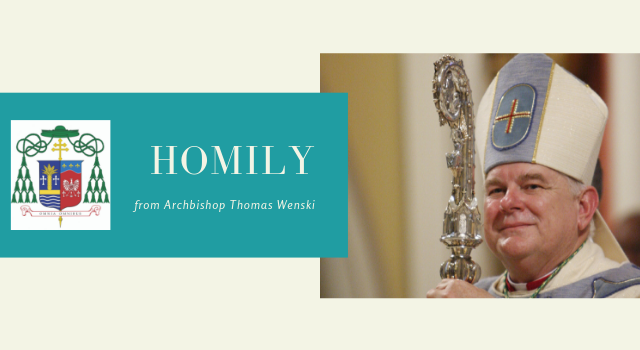By Archbishop Thomas Wenski - The Archdiocese of Miami
Archbishop Thomas Wenski preached this homily at the annual Red Mass for people in the legal profession in Miami-Dade County. The Mass is organized by the Miami Catholic Lawyers Guild and celebrated at Gesu Church in downtown Miami, Dec. 1, 2022.
Today's Red Mass — invoking the guidance of the Holy Spirit on the officers of the court — unites us to a long and noble tradition which recognizes the sovereignty of God over all human claims to sovereignty. A tradition which our own experiment in constitutional democracy has embraced.
In this country, at least up till now, thanks to the religious freedom guaranteed by the first amendment, religious communities have been able to play an active role in society and to express their own vision of the human person and of the policies that rule society. The Civil Rights Movement of the 1960s was a religiously inspired movement; it was led by pastors, and those who marched gathered first in their churches. Some today resent the public advocacy of religious people and communities. They accuse us of trying to impose our views on others. Yet, as St. John Paul II explained, the Church does not impose, she proposes. Martin Luther King, Jr. and his movement for racial justice could not impose their views on the American people. They understood this — and, for this reason, they opted for non-violence. But they made a proposition that touched the conscience of a nation.

Photographer: JIM DAVIS | FC
Archbishop Thomas Wenski pauses before the procession starting the 2022 Red Mass, Dec. 1, 2022 at Gesu Church, Miami.
However, religious freedom is increasingly under stress in our nation — and this week the Respect for Marriage Act will add to this stress as President Biden is likely to sign into law this misleadingly labeled piece of legislation.
This law came about because of the Dodd decision this summer when the Supreme Court returned to the States the regulation of abortion. Some feared that Court would set their sights on reversing Obergefell which gave us same sex marriage just as it has reversed Roe v Wade.
The bishops of the United States, led by Cardinal Dolan of New York, opposed this legislation as both unnecessary and harmful — but we did not prevail unfortunately. We will likely see more pressure put on the Church and her faithful by government regulations to bend to the prevailing winds of our culture.
Let us be clear: Our opposition to Respect for Marriage Act was in no way motivated by any animus towards anyone who experiences same sex attractions — nor do we condone any hostility to members of the LGBTQ community.
Catholic teaching has long affirmed that, like anyone else, people whose experiences include being attracted to the same sex are to be “accepted with respect, compassion, and sensitivity,” and that “[e]very sign of unjust discrimination in their regard should be avoided.” (Catechism of the Catholic Church, no. 2358)
Our core concern is what we fear will be the bill’s impact on religious liberty. The Respect for Marriage Act betrays our country’s commitment to the fundamental right of religious liberty. A number of religious groups and senators are asserting that the amended version passed by the Senate will sufficiently protect religious freedom. We bishops disagree. Our ministries comprise the largest non-governmental provider of social services in the United States. The provisions of the Act that relate to religious liberty are insufficient. The amended Act will put the ministries of the Catholic Church, people of faith, and other Americans who uphold a traditional meaning of marriage at greater risk of government discrimination through a potential minefield of conflicts concerning employment decisions, employees’ spousal benefits, eligibility for grants or contracts, accreditation, tax exemptions ... it runs the full gamut, including religious liberty conflicts arising out of state or local laws.
The Court’s ruling in Dobbs does not threaten same sex marriage. Obergefell established the freedom to enter into a same sex relationship; but many seek to go a step further and force private parties — religious organizations, individuals of faith — to approve and support those relationships by our own words and conduct. In other words, as Cardinal Dolan said, “we must bake the wedding cake, design the wedding website, rent the halls, and arrange the flowers — and afterwards, pay spousal benefits, place foster and adoptive children — even if it violates our deepest convictions about marriage and family.”

Photographer: JIM DAVIS | FC
In his homily during the Red Mass, Dec. 1, 2022, Archbishop Thomas Wenski urges judges and lawyers to resist efforts to marginalize Christian influence in society.
The Respect for Marriage Act seeks to shunt our idea of marriage aside. We who hold to these time-honored convictions would be voices in the wilderness, increasingly marginalized and dismissed in the face of Congress’s endorsement of same-sex civil marriages as the national norm. It would be an act of courage just to proclaim the wisdom of ages.
Professing religious faith should not make a person a second-class citizen. While religion is personal, it is never private. The right to religious freedom has its foundation in the very dignity of the human person. In today’s Gospel, Jesus speaks about the house built on rock. Religious freedom is the rock on which the house of liberty is built. Religious freedom is the human right that guarantees all other rights — peace and creative living together will only be possible if freedom of religion is fully respected.
Alexis de Tocqueville, a Frenchman who wrote approvingly about our American experiment in democracy in the early 19th century, said: “Despotism may be able to do without faith, but freedom cannot.”
Today, at this annual Red Mass, you come together as members of the legal profession but also as members of a faith community to invoke the assistance of the Holy Spirit. May the Holy Spirit give you the aid of his seven-fold gifts (wisdom, understanding, counsel, fortitude, knowledge, piety and fear of the Lord). Thus, following the example of St. Thomas More, may you be, in his words, “for the greater glory and honor of God and in pursuit of His justice... able in argument, accurate in analysis, strict in study, correct in conclusion, candid with clients, honest with adversaries, and faithful in all details of the faith.” The example of this martyr and confessor of the faith should inspire your imitation even as you seek his intercession before Jesus, as you live out your commitments to the Bar and to your Baptism.

